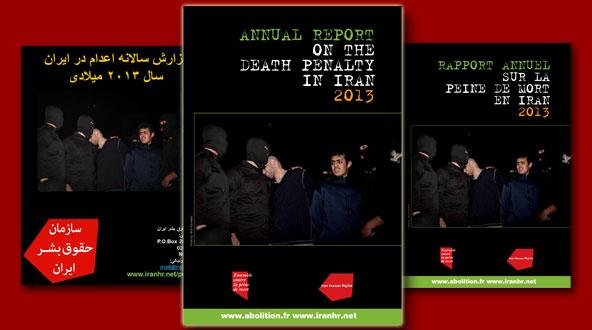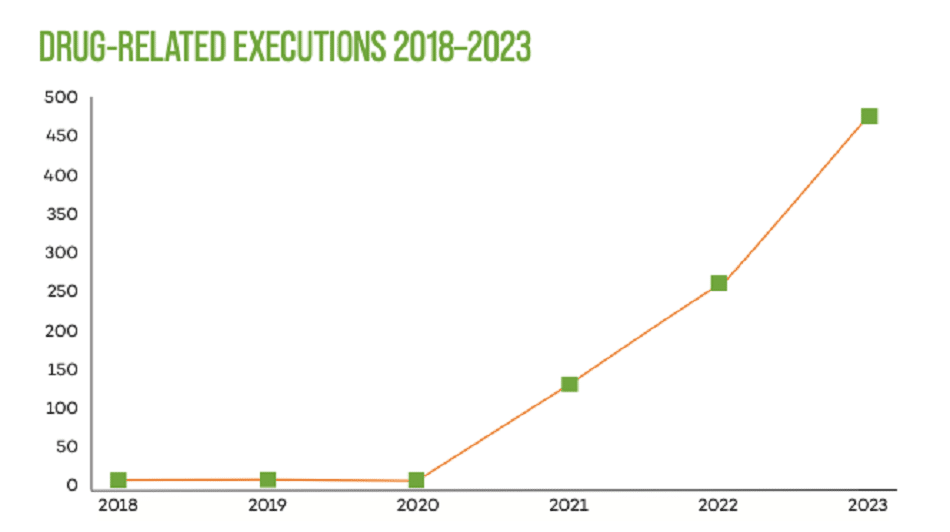
World Coalition members call for increased scrutiny of Iran
According to the 2013 Annual report on the death penalty in Iran published by World Coalition member organisations Iran Human Rights (IHR) and Together Against the Death Penalty (ECPM), most of last year’s 687 confirmed executions took place after the election of a new president seen as a reformer in June.
“There is no doubt that the period after the election of Hassan Rohani has not seen an improvement in human rights,” said IHR’s founder and spokesman Mahmood Amiry-Moghaddam. He stressed that death penalty use increased while the so-called 5+1 negotiations on Iran’s nuclear programme made progress at the international level. “Two thirds of executions happened after the election, while the West was improving its relations with Iran. Now no Western leader can travel to Iran without mentioning the death penalty,” he added.
The report compiles official sources as well as tips on secret executions from informers in Iran to document detailed trends including the disproportionate use of the death penalty against drug traffickers, foreign nationals and ethnic minorities as well as the continued sentencing and execution of juvenile offenders.
“The death penalty as a benchmark for the human rights situation in Iran”
Following repeated calls by abolitionists, the UN Human Rights Council renewed the mandate of its special rapporteur on Iran, Ahmed Shaheed, on 28 March.
ECPM executive director Raphaël Chenuil-Hazan described “the death penalty as a benchmark for the human rights situation in the Islamic republic of Iran and anywhere else” and the rapporteur as “a fundamental independent mechanism to monitor the situation of human rights in Iran”. He told a special meeting on Iran on the side of the Human Rights Council on 18 March 2014: “We urge the Iranian government to allow Ahmed Shaheed to visit Iran and its prisons in order to assess the situation of executions and sentences and to have more transparency.”
IHR and ECPM launched the report at the UK House of Parliament on 11 March 2014 before a group of MPs, civil society activists and journalists from the UK and Iran, and visiting participants from as far away as Lebanon. “Making ourselves known to an audience interested in the death penalty and human rights in Iran is a first step towards collaborations with politicians and NGOs,” said Mahmood Amiry-Moghaddam.
The event gave him an opportunity to be interviewed by London-based media broadcasting to Iran. He said prior annual report launches had been good opportunities to create links with people interested in IHR’s detailed knowledge of death penalty issues in Iran. For example, the presentation of the 2009 report in collaboration with Amnesty International at the Italian Senate led to the creation of a local section of IHR in Italy.
Collaboration between World Coalition members
For the past three years, ECPM has partnered with IHR to help with the finalisation, publication and presentation of the report. “This collaboration is an example of how it can make our efforts more efficient,” said Mahmood Amiry-Moghaddam. Raphaël Chenuil-Hazan said more international meetings were planned, including a presentation at the Swiss Parliament in June.
While possibilities to act within Iran are limited, the World Coalition and its members have been active in international organisations to increase pressure on the Islamic Republic and its partners. Mahmood Amiry-Moghaddam cited the example of anti-drug cooperation programmes under the UN Office on Drugs and Crime (UNODC): “They praised the Iranian authorities for seizing the highest amount of opium in the world, but they did not mention the hundreds of executions for drug trafficking. We say: it does not stop here.”
Raphaël Chenuil-Hazan told the London meeting: “With the World Coalition Against the Death Penalty, we have asked many European governments directly to stop supporting repression activities against drug trafficking in their cooperation with UNODC programs. The UK and Denmark have stopped part of their cooperation as a result” of lobbying action spearheaded by two other member organisations, Reprieve and Harm Reduction International.
Another benefit of international activism on Iran is to expose lesser-known aspects of the death penalty in the country. The 18 March event was organised by Association for Human Rights in Kurdistan of Iran-Geneva (KMMK-G), a new World Coalition member, and it focused on discrimination in the administration of capital punishment.
“Iran is a multi-ethnic country and the death penalty problems are even worse against ethnic minorities,” said Mahmood Amiry-Moghaddam in reference to the Kurdish, Arab and Baloch communities of the Iranian periphery. “Traditionally, mainly events in the central of the country have received international attention, but we want to change that.”
Categories
Iran (Islamic Republic of)






